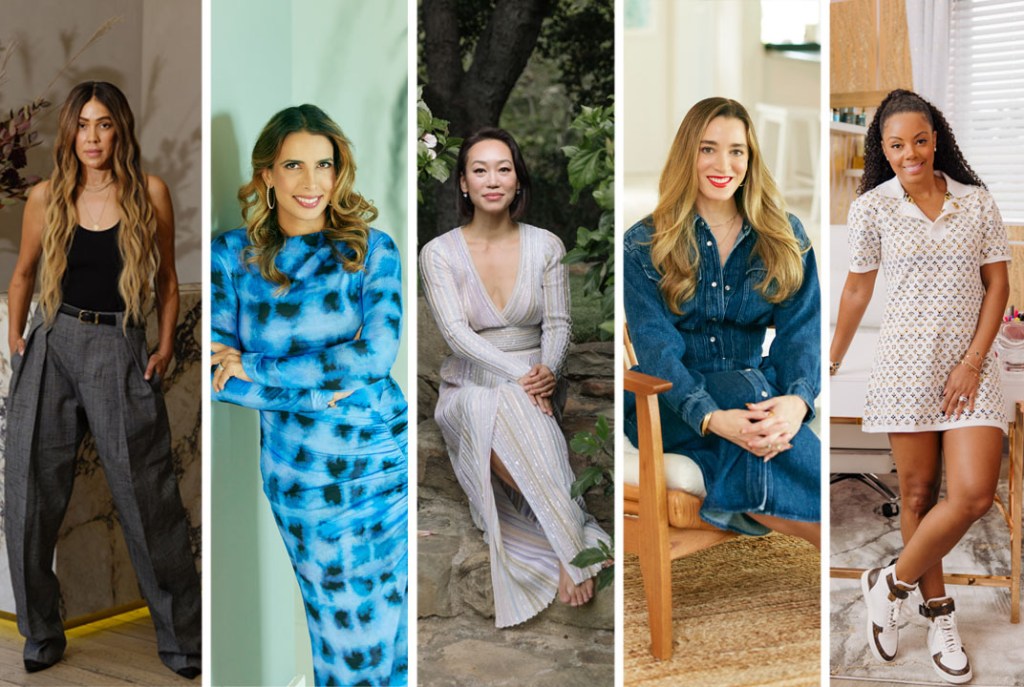Cristina Nuñez

Cofounder and general partner, True Beauty Ventures
The statistics are terrible. In 2022, less than 2 percent of venture capital funding went to women and less than 1 percent to women of color. There are two parts to this. Venture capitalists are predominately male — women represent only 9 percent of venture capitalists and 8 percent of firm partners. I try to make a difference directly, by investing and putting dollars to work in order to change those statistics about female founders, and also indirectly, by giving a new face to what a venture capital or private equity professional looks like. I don’t have the traditional profile of what you think of when you think about venture capitalists. It’s also not just me — we’ve established an entire team of female and diverse women, who provide a new perspective on how we think about investments.
Related Articles
We also have to hold our portfolio brands accountable and make sure they have representation at the leadership and board levels. Every quarter we do a company census and each of our portfolio companies provides us with a demographic breakout.
To me, success is being fulfilled and finding joy in what you do. We’re a young company, but I feel successful because I know we’re making an impact. When what I do allows other women to achieve their goals and be successful themselves, when I’m enabling them to get to the next level, when they’re one step closer to scaling their businesses, maybe even having a successful exit and achieving the kind of success that enables them to invest in future generations of women, that is investing in a female flywheel. This is where we’re creating movement and potential change, because the gap is huge. We have a long way to go to make it equitable for women raising VC funding.
Divya Gugnani

Founder and chief executive officer, 5Sens and Wander Beauty; founding partner, Concept to Co
I’ve always followed the opportunity, never the money. I learned early on that outstanding businesses are built by outstanding people. Throughout my career, I’ve had a lot of formal investment training, which is so important. I see so many women trying to change the table for women, but they don’t have the training or the background. You need to know what you’re doing to effectuate change.
I made my first personal investment in 2000 in Tell Me Networks, which was sold to Microsoft for $900 million. Since then, I’ve done 76 deals in companies running the gamut from consumer to tech. After I sold my company to QVC, I formalized all of this in a fund. As a woman and a woman of color, I lived the statistics about raising money and as an entrepreneur, I experienced the challenges of building a company.
I wanted to form an ecosystem that creates change for those around me, as well as myself, so that I can learn and grow. I joke that I’m not a know-it-all, I’m a learn-it-all. If I don’t know something, I’ll figure it out. The hallmark of a successful entrepreneur is being intellectually curious, and if you have that DNA, you just keep going.
One thing that I saw as a professional investor at a private equity fund was that men would come into a pitch meeting with zero data and say, “I’m going to launch this company and it’s going to be worth a billion dollars.” It was the sheer confidence in the room that garnered the check. Then the women came in, and they had the data and the proof case, but they lacked the confidence. I learned that you need to believe in you first. That self confidence will emanate and attract the best talent to work at your company and turn that vision into a reality and turn the best investors into a check and help you scale your company. My confidence was built out of many years of growing, building, learning. That confidence is everything — it’s the difference between success and failure.
Monique Rodriguez

Founder and chief executive officer, Mielle
I like to always lead by example. I started my platform with the hopes and dreams of motivating and inspiring other female entrepreneurs to go after their dreams and show you can have it all — you can be a wife, a mama, an entrepreneur, you can tackle what you want to as long as you have the perseverance and resilience to go after your dreams. When you go after your dreams you’re helping people you might not know, because they connect to your dreams.
My platform started out with me doing a lot of peer tutorials and educational styling videos to educate my community on how to take care of their natural-texture hair, and then quickly became a resource for entrepreneurs to understand what it takes to grow and scale their businesses. Our new campaign focuses on the power of sharing sisterhood. We have to operate from a spirit of abundance, not a lack, meaning there is more than enough room for everyone at the table. I believe in lifting as I climb and for us to have more females at the table, we have to reach back and pull others up.
Support doesn’t always have to be monetary — support also looks like showing up. People put an emphasis on ‘I can’t afford to do this,’ but there are many different ways to show up for people without necessarily putting dollars down. Just being able to talk about the brand is important. Community advocacy is key.
One of the reasons that funding is still so low for women, especially women of color, is that we don’t see it enough. I don’t think that there’s the belief that Black and brown women entrepreneurs can build something valuable and scale it to the next level. As we continue to normalize that, and show people like myself and other entrepreneurs who are building great companies, it creates that much more belief in the next Black woman who sits down at a table of investors, because they’ve seen the value creation women can drive. I know that if we provide resources, access and expertise, we can ignite this engine and help you skyrocket to the next level.
Vicky Tsai

Founder, Tatcha
Women founders are often the only females in the room. We have difficulty getting funding and being taken seriously. As women in business, we’re often the target of sexual harassment or assault and gender- and race-based discrimination and the power dynamics are almost never in our favor. Navigating how to be a leader in that dynamic requires very specific knowledge.
The way I give back is by remembering that I only got to where I am because someone helped me, and it is my responsibility to lift others and make things better for them. I don’t want the women coming behind me to experience the things I did. I mentor brand founders, do private investing in start-ups, and I focus on broader social impact through Tatcha’s Beautiful Faces, Beautiful Futures, where we invest in girls’ education internationally. Thus far we have funded 8.75 million days of school globally for girls.
The biggest thing that I’ve learned is that facts are our friends.
When I was starting Tatcha and having trouble raising capital, I hd no idea that less than five percent of VC dollars go to women-funded businesses. I just assumed there was something wrong with me. It made the journey so much harder and there was a human cost to the experience.
Then, in 2018, I was told that I was not a real CEO, and was asked to step down from the company I had founded and led successfully for nine years. I internalized criticism and believed it. I wish I had known then that Harvard Business Review issued a report that same year stating that Asian Americans were the least likely demographic to be promoted to senior management. Asian females fare the worst, making up less than 0.4 percent of directors in the Fortune 500 because they are perceived to lack leadership qualities.
In 2021, just as I was returning to Tatcha as CEO for a second time to execute a turnaround, WWD published a story showing that only three of the top 20 beauty manufacturers had female CEOs. Seeing my story in numbers allowed me to put down the burden of that self doubt. The data made me realize there is a systemic issue. It was never about me.
Today, I believe three out of the top five skin care brands at Sephora are being led by Asian women. When diverse people are given a fair shot in leadership roles, not only can they prove there is more than one model for success, but they’re better able to reflect the diverse needs of the clients and employees who we exist to serve.
Shani Darden

Founder, Shani Darden Skincare
My mentorship program started shortly after the pandemic and the Black Lives Matter moment. I don’t think I have all of the answers, but I know how hard it is to be an aesthetician and to start a brand. I work with mentees on whatever they need help with. It’s difficult when you’re first starting out and don’t have a lot of money, so I might give them advice on where to go for packaging, for example, that doesn’t require large quantities to start out with. Or I might set up a meeting. Ali Webb from DryBar first introduced me to Sephora — I wouldn’t have gotten that meeting without her. I’ve been working with Sienna Brown of Glosshood as a mentee, so I introduced her to Sephora. She was accepted to the Sephora Accelerator program. That’s beyond amazing. I can’t wait to get in there and buy those products when they launch!
When I’m working with entrepreneurs, I’m looking for someone who is beyond motivated. It’s challenging to start a business and I want to stop people from making the mistakes I made. For instance, I’m working with an aesthetician who has about 30 stock keeping units in her line and we just went in and said, you have to cut half of that!
Everybody needs a champion. Dr. Erma Benitez was mine. She’s a dermatologist who hired me just out of aesthetician school, which is unheard of. But she took a chance on me and taught me everything, and that opportunity is for sure why I’m a good aesthetician today.



